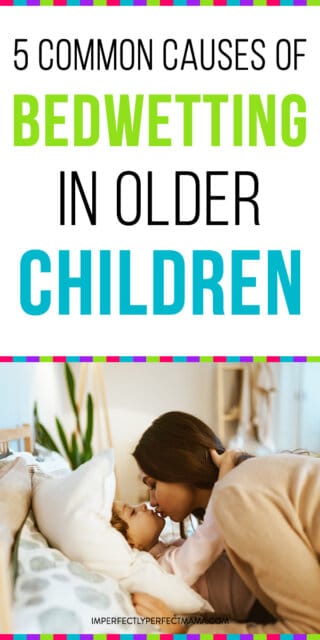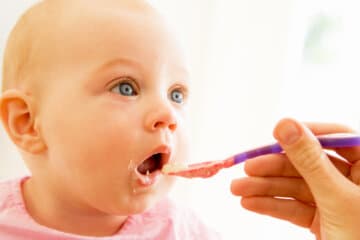One of the most satisfying moments in the life of a parent is the day a child finally becomes fully potty-trained.

No more diapers! No more middle-of-the-night sheet changes!
But what if that day hasn’t come yet?
If your child has reached grade school age, you might be wondering if they will ever be dry at night.
Nighttime bedwetting (also called nighttime incontinence or enuresis) is common in younger kids.
By age five, most children are able to stay dry at night.
But since children develop nighttime dryness at different ages, sometimes you need a bit of patience if your child is taking longer to develop those habits. Unless it’s accompanied by other symptoms, bedwetting isn’t usually a cause for alarm.
And even if your child still wets the bed after they turn 5, you aren’t alone.
Five to ten percent of children still wet the bed at age 7, and many will simply outgrow it with time.
But if it continues after age 7, or your child suddenly starts wetting the bed after a period of dryness, there might be underlying medical reasons that are worth looking into.
If bedwetting is causing your family to lose sleep or interfering with your child’s social activities, read on to learn some common causes of bedwetting in older children and when it might be time to see a doctor.
What Are Some Common Causes of Bedwetting?
If your older child can’t stay dry at night, you might be getting frustrated.
You’ve tried the bedwetting alarms, and you’ve tried restricting fluids before bedtime, but nothing seems to work. You no longer want to hear that your child will simply grow out of it, or that they are just a deep sleeper.
Maybe your child is ashamed and is withdrawing from social activities like sleepovers and overnight camps. Nightly sheet changes are exhausting for you, and your child. So what can you do?
Rest assured that your child’s bedwetting is almost never due to laziness or lack of effort. But keep an eye out for these common causes of nighttime bedwetting in older children.
1. Sleep Apnea
Obstructive sleep apnea is a condition that causes your child’s airways to be blocked during sleep.
Sleep apnea can be caused by several factors, such as obesity or having a family history of sleep apnea.
But one common cause of sleep apnea is large tonsils or adenoids that block your child’s airway. If your child has large tonsils that block their airway during sleep, it can impact them in several ways.
Not only does it cause restless sleep, it can also cause changes in the chemical balance in the body and especially the brain. Because the brain has to work harder to take in oxygen, it has less energy for other bodily functions, like bladder control.
Some kids lose control of their bladders entirely during sleep, causing them to wet the bed more frequently. If this is the case, you may want to talk with your doctor about whether sleep apnea might be causing your child’s bedwetting. If it is, your doctor may recommend having your child’s tonsils removed.
2. Chronic Constipation
You might think of constipation as something that only affects your child’s ability to have a bowel movement.
But did you know that chronic constipation can cause urinary problems such as nighttime bedwetting? If a child is constantly backed up, excess stool can build up in the rectum, which pushes on the bladder. This makes it hard to stay dry, especially at night.
In severe cases, symptoms can last for months. Some studies have shown that treating constipation with stool softeners or even laxatives (under the supervision of a doctor) can successfully put an end to bedwetting in children.
3. Stress and Anxiety
As the saying goes, kids are resilient. But they aren’t superhuman.
They experience stress and anxiety, like any of us.
The result can be a sudden onset of wet sheets.
And if kids feel embarrassed or worried about their bedwetting, the stress of those feelings can make bedwetting worse. That’s why it’s important to approach bedwetting with patience and understanding, rather than anger and punishment.
It’s no surprise that one recent study showed a spike in both daytime and nighttime bedwetting in kids since the start of the Covid-19 pandemic, as kids deal with drastic changes to their lives. But pandemic-level anxiety isn’t the only factor.
Any type of stress in a child’s life can lead to bedwetting. This can include a new sibling, starting school, the loss of a loved one, or other trauma.
4. Urinary Tract Infections
Although more common in adults, even kids can get a Urinary Tract Infection (UTI).
This can cause sudden bedwetting and daytime accidents.
It’s usually accompanied by painful urination, red or pink urine, and having to go more than usual.
If your child has any of these symptoms, it’s definitely time to see a doctor. If this is the cause, the bedwetting will likely clear up once the infection is gone.
5. Diabetes
Some of the early symptoms of Type 1 Diabetes in children are daytime accidents and bedwetting.
Other symptoms are likely to appear around the same time, such as excessive thirst and frequent urination. This doesn’t mean you should panic and assume your child has developed diabetes if they suddenly start waking up with wet sheets.
But if you have a family history of diabetes, you might want to talk to your doctor if your child starts wetting the bed, particularly if they have previously been dry at night.
When Should You Call a Doctor?
If your child is under 7 and has no other symptoms or medical conditions, it’s probably fine to wait to see if the bedwetting stops on its own.
Some parents find success with bedwetting alarms or other lifestyle changes. But doctors recommend seeking medical advice in any of these scenarios:
- Your child snores at night, which could be a sign of sleep apnea
- Urination is frequent, painful, burning, or discolored (pink or red)
- Bedwetting starts suddenly after six months or more of dryness
- Your child suddenly starts eating or drinking significantly more than usual
- You see signs of constipation, such as hard stool or abdominal pain
You know your child best.
If you have concerns about your older child’s bedwetting, trust your instincts and talk to your doctor.




Leave a Reply